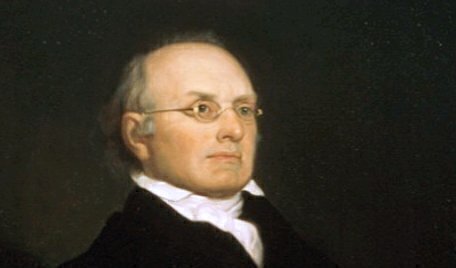On March 1, 1842, Justice Joseph Story wrote the first major opinion regarding the power of the federal government over slavery. Prigg v. Pennsylvania had far-reaching consequences, in the passing of new “personal liberty” laws by Northern states and the subsequent stronger federal Fugitive Slave Act in 1850. It also provided the basis for the Reconstruction Congress’s Civil Rights Act of 1866 and the 14th Amendment.
 Justice Story took his seat on the Court on February 3, 1812. He was and remains the youngest person—at 32 years, 58 days—to be nominated to the Supreme Court in history. Between his commentaries on the Constitution and his 33 years on the Court, Story was an integral force in shaping the contours of American law.
Justice Story took his seat on the Court on February 3, 1812. He was and remains the youngest person—at 32 years, 58 days—to be nominated to the Supreme Court in history. Between his commentaries on the Constitution and his 33 years on the Court, Story was an integral force in shaping the contours of American law.
Just a year before Prigg in 1841, Story penned the majority opinion in United States v. Amistad, in which the Court granted freedom to the captured Mende men who rebelled and captured a Spanish schooner. He reminded Americans that the “African slave trade is utterly abolished; the dealing in that trade is deemed a heinous crime, and the negroes thereby introduced into the dominions of Spain are declared to be free” and that because they were not slaves, but kidnapped Africans, they were “entitled to their freedom.”
In Prigg, the defendant Edward Prigg was a Maryland-based “slave catcher” indicted under Pennsylvania’s 1826 “Personal Liberty” law for attempting to recapture a fugitive slave woman Margaret Morgan and her children in Pennsylvania. Morgan was married to a free black man, Jerry Morgan, and in 1832 they had moved across the border from Maryland to Pennsylvania. Even though there was evidence Morgan was freed by her previous owner, the successor to his estate recognized no such freedom and sent Prigg and other slave catchers to recapture her. Although the children were not “fugitive slaves,” they were all captured and sold to a slave trader for shipment to the deep South. Historians are not sure what happened to the Morgansbut believe it is likely a family of free Americans was broken up forever.
Story held that the Pennsylvania Personal Liberty law was unconstitutional as conflicting with the exclusive federal power to seize and reclaim fugitive slaves under the Fugitive Slave Clause—a conclusion Chief Justice Taney, the future author of Dred Scott, disagreed with. (Taney thought that states could pass Fugitive Slave laws which did not interfere with the property rights of slaveowners but further protected their rights) The sole dissenter, John McLean, took the flipside of Taney’s position, arguing that under state police powers to “protect its jurisdiction and the peace of its citizens in any and every mode which its discretion shall dictate, which shall not conflict with a defined power of the Federal Government,” it could protect free black citizens from being captured as fugitive slaves.
Despite Story’s affirmation of federal power over fugitive slaves, he personally detested slavery and refused to recognize “property in man,” stating that, “the state of slavery is deemed to be a mere municipal regulation, founded upon and limited to the range of the territorial laws.” As legal historian H. Robert Baker notes, “Story chose the path that he believed best supported a strong Union and rejected the natural right of slaveholders to the people they claimed as property. His resonating opinion answered southern constitutional claims in ways that protected slaveholders’ rights, but not on the terms they wanted.”
Under Prigg, the Fugitive Slave Clause guaranteed enslavers their right to recapture enslaved persons and delegated to Congress constitutional authority to protect and enforce the right. But states could refuse to assist slave owners in reclaiming their slaves because Congress could only compel federal judges and legal officers to enforce constitutional rights secured by the federal Constitution. Thus, after Prigg, new state “Personal Liberty” laws in the North directed state officers and courts to refuse to enforce the rights of southern enslavers.
Five years later, the Court upheld Story’s conclusion that the Fugitive Slave Act of 1793 was constitutional. Yet, because pro-slavery forces saw Prigg as greatly weakening the power of the Fugitive Slave Act of 1793, they demanded a stronger enforcement act. The Fugitive Slave Act of 1850 was part of the Compromise of 1850 struck by Henry Clay and Stephen Douglas to settle the dispute between Northern and Southern states over the settlement and admissions of new states and territories following the Mexican-American War. The new act required federal judicial officials in all states and federal territories to assist with the return of escaped slaves to their masters in the states and territories permitting slavery, and enslaved persons could neither ask for a jury trial nor testify on their own behalf.
Historians broadly believe the Fugitive Slave Act of 1850 had a significant role in moving the nation toward Civil War, as Northern states cited the principles of state sovereignty to resist the new act, but remained divided over the meaning of the decision and to what degree it was pro-slavery.
Story died just three years after Prigg, leaving not only a lasting judicial legacy after 33 years after the court, but a decision which not only factored into the Civil War, but the reconstruction of the nation thereafter.
Nicholas Mosvick is a Senior Fellow for Constitutional Content at the National Constitution Center.







